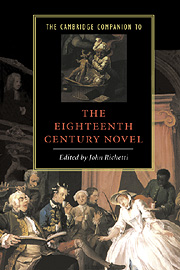Book contents
- Frontmatter
- 1 Introduction
- 2 The novel and social/cultural history
- 3 Defoe as an innovator of fictional form
- 4 Gulliver's Travels and the contracts of fiction
- 5 Samuel Richardson
- 6 Henry Fielding
- 7 Sterne and irregular oratory
- 8 Smollett's Humphry Clinker
- 9 Marginality in Frances Burney's novels
- 10 Women writers and the eighteenth-century novel
- 11 Sentimental novels
- 12 Enlightenment, popular culture, and Gothic fiction
- Index
6 - Henry Fielding
Published online by Cambridge University Press: 28 May 2006
- Frontmatter
- 1 Introduction
- 2 The novel and social/cultural history
- 3 Defoe as an innovator of fictional form
- 4 Gulliver's Travels and the contracts of fiction
- 5 Samuel Richardson
- 6 Henry Fielding
- 7 Sterne and irregular oratory
- 8 Smollett's Humphry Clinker
- 9 Marginality in Frances Burney's novels
- 10 Women writers and the eighteenth-century novel
- 11 Sentimental novels
- 12 Enlightenment, popular culture, and Gothic fiction
- Index
Summary
Henry Fielding was born in 1707, into a family in straitened circumstances but of aristocratic connections. A family myth, based on forged papers, claimed descent from the Habsburgs. The combination of financial embarrassment and gentlemanly caste is emblematic of the whole atmosphere of his life, and is variously reflected in his writings. He turned to writing fiction for a living (and to practicing law for the same reason) after his career as a prominent and successful dramatist was ended by the Licensing Act of 1737, which his own antigovernment plays helped to precipitate. He is the only one among the early novelists whose origins were patrician, and the only one whose style and cultural loyalties were closely tied to the tradition we sometimes call Augustan. Early in his career he sometimes called himself Scriblerus Secundus, after the Scriblerian coterie of Swift and Pope. One of his earliest poems, however, was an unpublished mock Dunciad against these authors, discovered some years ago among the papers of his cousin Lady Mary Wortley Montagu, an adversary of Pope and his friends.
- Type
- Chapter
- Information
- The Cambridge Companion to the Eighteenth-Century Novel , pp. 120 - 152Publisher: Cambridge University PressPrint publication year: 1996
- 17
- Cited by

